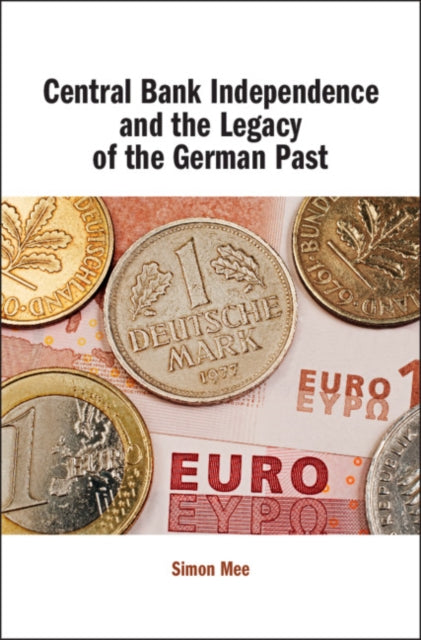Simon Mee
Central Bank Independence and the Legacy of the German Past
Central Bank Independence and the Legacy of the German Past
YOU SAVE £24.69
- Condition: Brand new
- UK Delivery times: Usually arrives within 2 - 3 working days
- UK Shipping: Fee starts at £2.39. Subject to product weight & dimension
Bulk ordering. Want 15 or more copies? Get a personalised quote and bigger discounts. Learn more about bulk orders.
Couldn't load pickup availability
- More about Central Bank Independence and the Legacy of the German Past
This is a study of how German monetary history – in the form of the lessons learned from Germany's experience of inflation in 1922–3 and 1936–45 - became politicised in the post-war era and transformed into a political weapon in debates surrounding the establishment of West Germany's central bank and who should control monetary policy.
Format: Hardback
Length: 368 pages
Publication date: 12 September 2019
Publisher: Cambridge University Press
The 2008 financial crisis sparked a surge in political attacks on central banks, reminiscent of the intense debates among Germany's political elites in 1949. The establishment of West Germany's central bank, the Deutsche Bundesbank, marked a turning point in the country's monetary history, as it became a political battleground for central bankers, politicians, industrialists, and trade unionists. Simon Mee's book delves into how a specific version of inter-war history, emphasizing the lessons learned from Germany's inflationary periods, was weaponized and linked to a contemporary argument for an independent central bank. The author challenges prevailing assumptions about the evolution of central bank independence, highlighting its continued relevance in today's world.
The 2008 financial crisis marked a significant turning point in the global economic landscape, leading to increased scrutiny and criticism of central banks. The recent focus on central bank independence has echoes of the fiery debates that took place in Germany in 1949, shortly after the establishment of West Germany. In his book, Simon Mee explores how the establishment of the Deutsche Bundesbank transformed the country's monetary history into a political arena. Central bankers, politicians, industrialists, and trade unionists all vied for influence over the legal provisions that defined the future role of the central bank. Mee reveals how a specific version of inter-war history, emphasizing the lessons learned from Germany's inflationary periods, was weaponized and used to support the argument for an independent central bank. The book challenges prevailing assumptions about the evolution of central bank independence and its relevance in today's world.
The 2008 financial crisis and the subsequent debates on central bank independence have historical roots dating back to the establishment of West Germany in 1949. In Simon Mee's book, he delves into how the creation of the Deutsche Bundesbank transformed the country's monetary history into a political battleground. Central bankers, politicians, industrialists, and trade unionists all sought to influence the legal provisions that defined the central bank's role. Mee highlights how a specific version of inter-war history, emphasizing the lessons learned from Germany's inflationary periods, was weaponized and used to support the argument for an independent central bank. The book challenges prevailing assumptions about the evolution of central bank independence and its relevance in today's world.
The 2008 financial crisis and the ongoing discussions on central bank independence trace their origins back to the establishment of West Germany in 1949. In Simon Mee's book, he explores how the creation of the Deutsche Bundesbank transformed the country's monetary history into a political arena. Central bankers, politicians, industrialists, and trade unionists all competed for influence over the legal provisions that defined the central bank's role. Mee reveals how a specific version of inter-war history, emphasizing the lessons learned from Germany's inflationary periods, was weaponized and used to advocate for an independent central bank. The book challenges prevailing assumptions about the evolution of central bank independence and its significance in today's world.
Weight: 732g
Dimension: 234 x 160 x 26 (mm)
ISBN-13: 9781108499781
This item can be found in:
UK and International shipping information
UK and International shipping information
UK Delivery and returns information:
- Delivery within 2 - 3 days when ordering in the UK.
- Shipping fee for UK customers from £2.39. Fully tracked shipping service available.
- Returns policy: Return within 30 days of receipt for full refund.
International deliveries:
Shulph Ink now ships to Australia, Belgium, Canada, France, Germany, Ireland, Italy, India, Luxembourg Saudi Arabia, Singapore, Spain, Netherlands, New Zealand, United Arab Emirates, United States of America.
- Delivery times: within 5 - 10 days for international orders.
- Shipping fee: charges vary for overseas orders. Only tracked services are available for most international orders. Some countries have untracked shipping options.
- Customs charges: If ordering to addresses outside the United Kingdom, you may or may not incur additional customs and duties fees during local delivery.


